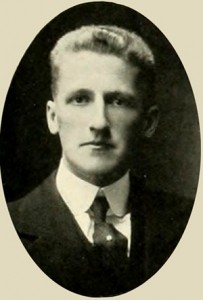Posted: September 25th, 2014 | No Comments »
I am, perhaps unsurprisingly, no expert in Turkish poetry. However, I’ve recently been reading Charles King’s absorbing history of interwar Istanbul, Midnight at the Pera Palace – The Birth of Modern Istanbul, and have learnt a little. King profiles many of the cultural figures who formed modern Istanbul including the leftist poet Nazim Hikmet, who spent many years in Turkish prisons and in exile in the USSR. One major work by Hikmet, and new to me, is his long poem Gioconda and Si-Ya-U, published in 1929. The poem concerns Da Vinci’s Mona Lisa (also known as La Gioconda) which falls in love with a Chinese communist and decides, basically, to elope with him. The poem has elements of Chinoiserie, whimsy, fantasy and reflects the massacre of leftists in Shanghai in 1927, suggesting that Mona Lisa joined the revolution in the city and was killed and burnt. The poem was in memory of Hikmet’s friend and comrade Hsiao San (Si-Ya-U) who he had befriended in Moscow in the early 1920s and believed had been killed in Shanghai in 1927, but in fact had survived. The two eventually reunited in Vienna in 1951 and again in Peking in 1952. You can read the entire poem here. I’ll excerpt several verses of interest to China Rhymers I expect….
Shanghai is a big port,
an excellent port,
It’s ships are taller than
horned mandarin mansions.
My, my!
What a strange place, this Shanghai…
In the blue river boats
with straw sails float.
In the straw-sailed boats
naked coolies sort rice,
raving of rice…
My, my!
What a strange place, this Shanghai…
Shanghai is a big port,
The whites’ ships are tall,
the yellows’ boats are small.
Shanghai is pregnant with a red-headed child.
My, my!

Posted: September 24th, 2014 | No Comments »
John Kuo Wei Tchen’s Chinese America ….
and I do believe that’s a young Anna May Wong there on the cover….
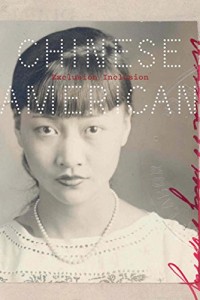
Presents the history of the Chinese American experience, from the role of Chinese tea in the American Revolution and the rich commercial and cultural interactions between China and the U.S., to an exploration of the practices and principles developed under Chinese Exclusion and their application to other cultural groups. This concise, illustrated history considers the legacy and lessons of this period in America’s history through photography, documents and historical objects.
Posted: September 23rd, 2014 | No Comments »
I recently reread a favourite novel of mine, one that has nothing to do with China at all (or so I thought) – Harold Clewe’s The Long Memory (1951), a rather good example of 1940/50s British noir crime writing (and adapted as a rather good John Mills film in the 1950s). But it seems China seeps in everywhere. The book is set in and around Gravesend, Kent and along the Essex/Kent stretches of the lower Thames as well the marshlands thereabout. A former criminal on the run hides out in an old beached Thames barge and takes up with a refugee woman who makes the place nice for him. One day he comes back to find a jug with flowers in – bamboo blossom…
“It is hard to believe that bamboo should be found in such a place, much less that it should flower there; but it does. For among the cargoes that flow into the port of London there are many from the Orient. The disposal of the packaging and cratage of these goods is quite a problem. Usually it is tipped into lighters and dumb barges which are towed down-stream to places like Mucking Flats and the marshes of the Kentish bank, and there dumped or burned in some way rendered innocuous. The straw and hay and dried vegetation with which the goods are packed contain not only spiders and snakes such as one occasionally reads reports of in the press, but seeds, too, of all kinds.
Some of the seeds survive and take root and grow, so that in summer the rubble dumps are gay with curious Oriental blossoms, among the sardine tins and bicycle wheels and rotting straw. How the bamboo that Elsa found came to bloom in that place at that time of the year nobody can say; we had had a kindly autumn certainly, and a spell of warm weather, and that may have brought it about. But there are many kinds of bamboo sand it seems more likely that this was one of the type, familiar I believe in Burma*, which blossoms only rarely, at long and irregular intervals with sometimes years between, and irrespective of weather or season; mid-winter is lit with bright unexpected flowers.”
* = probably Bambusa burmanica (as below)


Posted: September 22nd, 2014 | No Comments »
Many thanks to those who offered a possible original source for the anecdote about Empress Cixi pausing in a meeting to order “Lotus Fragrance” thrown down a well. The anecdote was told to the London theatre critic James Agate by the American diplomat Herschel Johnson in 1937. It amused Agate and stuck in his mind to the point he included it in his memoirs. Here’s my post. But what’s the origin?
Well the consensus and almost unanimous position of those of you out there better informed than me is that the tale is the product of that old scandal monger and thoroughly likeable rogue Edmund Backhouse and its probably a version of a story he tells in Decadence Mandchoue that goes something like, Cixi’s victims included political rivals, those whose policies she opposed and enemies within the palace, including the favourite concubine of her son and Emperor Tongzhi. In 1900, she had two eunuchs throw the woman down a well in the palace, after she had insulted her. Lotus Fragrance?

Posted: September 21st, 2014 | No Comments »
I’ve always liked Lisa See’s books – On Gold Mountain, the story of her own family was fascinating and I also enjoyed the recent Shanghai Girls. She is building a strong library of tales around the Chinese-American experience. Now we have her latest book, China Dolls, which seems pretty much made for me – showgirls, Oriental nightclubs, the late 1930s and looming war! And you can choose your cover – US or UK?
US
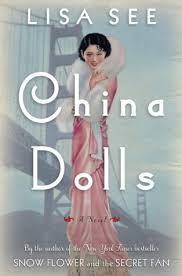
 UK
UK
It’s 1938 and the exclusive Oriental nightclub in San Francisco’s Forbidden City is holding auditions for showgirls. In the dark, scandalous glamour of the club, three girls from very different backgrounds stumble into each other lives.
All the girls have secrets. Grace, an American-born Chinese girl, has fled the Midwest and an abusive father. Helen is from a Chinese family which has deep roots in San Francisco’s Chinatown. And, as both her friends know, Ruby is Japanese passing as Chinese.
Then, in a heartbeat, everything changes. The Japanese attack Pearl Harbor and paranoia, suspicion, and a shocking act of betrayal, threaten to destroy their lives.
Posted: September 20th, 2014 | No Comments »
Following a post I uploaded back in January on the author Peter Blundell, one China Rhyming reader has been trying to put together a complete list of his books. But, as I noted in my post, Blundell is quite an ellusive author to track down. Orwell rated him so he has to be worth reading. He wrote mostly about Far Eastern port towns, had lived out in Malaya and Brunei and his real name was Frank Butterworth. Perhaps any fans of Blundell’s coming across this post can add anything to the list below which we believe is probably partial and not actually complete.I’ve attached a few notes I came across to the titles.
1.The Finger of Mr.Blee,a tropical comedy (1913)
Published as Frank Nestle Butterworth
2. Oh, Mr. Bidgood (1914)
described as a “nautical comedy”- available to read online for free here
3. Love-birds in the coco-nuts (1915)
4.The Kidnappers (1900)
Volume 10 of the Sovereign Series?
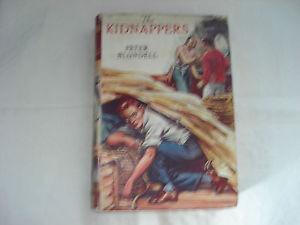
5. Wanted, A Tortoise-Shell (1917)
6. The Sin of Godfrey Neal (1920)
7. Mr. Podd of Borneo (1920)
Available to read for free online here
8. Lunatics Aboard (1921)
9. The Confessions of a Seaman (1924)

10. Princess of Yellow Moon (1922)
Available to read for free online here
11. City of Many Waters/On the Fringe of the Eastern Seas (1923/1924)
A view of Brunei from Bundell while he was resident in the state running a cutch factory.

12. The Banja Pirates (1924)

13. Morals of Matilda (1927)
14.The Star of the Incas (1926)

15. The Jungle Trail (1923)
Another Borneo story
If anyone can add to this list it would be much appreciated?
Posted: September 19th, 2014 | No Comments »
The Imperial War Museum’s archive has some rare and amazing footage of members of the Chinese Labour Corps (The Coolie Corps – see Mark O’Neil’s recent history of the CLC in the Penguin China WW1 series) at work and play, along with British soldiers and the Corps’ officers available to view online. There appears to be footage of the Corps working both in England to ship munitions and equipment to France and also close to the battle lines on the Western Front itself
Click here to view
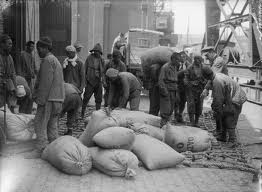
Posted: September 18th, 2014 | No Comments »
Can anyone shed any light on this anecdote from James Agate’s memoirs (I mentioned I was reading the theatre critic James Agate’s memoirs of the 1930s, Ego3, in a previous post)? Agate was a dinner on Christmas Day 1937 with, among others, (the wonderfully named) Herschel Vespasian Johnson, an American diplomat. Johnson recalled that a friend of his (unnamed sadly but presumably another long serving member of the US Diplomatic corps) has once overheard the Dowager Empress of China (Cixi) interrupt a political conversation to say, as an aside to a courtier, ‘I must have Lotus Fragrance thrown down a well.’
Very amusing, but who was Lotus Fragrance – a concubine, a servant? – and why did she deserve to be thrown down a well? And is it in any sense a true anecdote? Does anyone know. The little known NCpedia (an online encyclopedia about North Carolina) notes rather lovingly, ‘Herschel attended the Charlotte public schools, and from the beginning was an able student and an omnivorous reader, never athletic, and as a child not especially sociable.’ I know the feeling!
